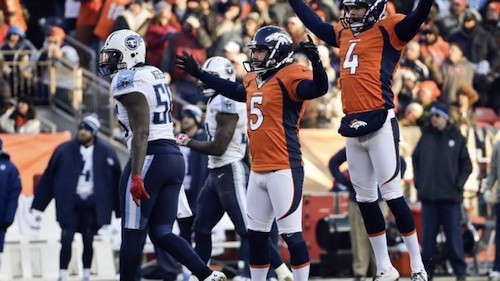On Monday night, ’twas a tale of two cities in the NFL — the Baltimore Ravens won (and put themselves in decent position to be a 3, 4, or 6 seed in the AFC Playoffs, depending on what happens with Cincinnati) and the Detroit Lions lost (and technically fell to third place in a terrible NFC North), and all this happened because of a 61-yard field goal to win it by Justin Tucker, who nailed a 40-yarder at Texas to beat A&M on Thanksgiving Night a couple of years ago too:
This was all only a couple of weeks after Matt Prater made the longest FG in NFL history (64 yards).
Fourteen kickers have now connected from 60 yards or more in NFL history. Of those, six — six — of them have come since Week 1 of the 2011 NFL season. That means basically half (a little less than half) of the longest field goals in pro football history have come in the last 2.5 seasons of the NFL. What’s up? Are the kickers getting better?
In many ways, yes. Look at this chart:
Kickers are much more successful from long distance in the most recent period covered — ’08 to ’11 in this case — then they were in any other incremental period beforehand. Some have argued that all this is a function of the NFL actually discouraging long field goals, but in fairness, coaches kind of discourage it too — it doesn’t seem like an ideal situation because the other team can get the ball back at the spot of the kick, which is why you often see coaches only do it at the end of a half or end of a game. Then, there’s always the chance this can happen:
CBS has some ideas about the rise in kicking too:
They’re in the weight room more, employ specialized training and superior techniques, kick on more favorable surfaces, generally are better coached and are used more effectively and efficiently on game day.
They benefit from better athleticism than their predecessors, come almost exclusively from soccer backgrounds, are aided by an increased emphasis on special teams and rule changes, and even by playing some of their games indoors.
It all adds up to greater accuracy, especially from long distances.
Some are even calling this “the golden age” of kickers.
On surface, all this makes sense — just as offenses and defenses have become more advanced over time, so too has the art and preparation of kicking. It’s allowing people to hit from 60-ish more frequently. And it’s allowing coaches to trot guys out there for the option even more.
The interesting flip side is what this does to the game as a whole. Some even believe that as kicking gets better and more accurate — right now the percentage of made extra-points and made FGs league-wide would be a single-year record for the NFL — the game becomes more boring. If you have a sure three, why gamble for the seven? If you know your guy can kick the ball from mid-field, why push the envelope and keep trying to get downfield? If you trust your defense and think you can win a 15-9 game consisting of eight field goals made between the two teams, well, it’s a W, right? So maybe kicking is making the game boring. Skip Bayless has claimed we should get rid of it.
I disagree. First off, a football purist would be into the strategy of football — I realize there aren’t a lot of sports purists around anymore, which is why people groan when the San Antonio Spurs invariably get to the Western Conference Finals — and having a kicker who is consistently true from 50+ yards changes the game plan for both sides. That’s interesting to watch play out. Secondly, I’d always take a Walk-Off Hail Mary over anything in any sport, probably — for example, this game was broadly irrelevant but conjures up amazing memories for a ton of people.
… but we can’t always get that, and a Hail Mary Walk-Off is basically the definition of dumb luck. If we’re going to keep up with the football-as-war metaphor, which many like to go with, well, war is actually about understanding your strengths and weaknesses in the context of your opponent. It might not be the most interesting thing to set up on a cliff three miles away and fire long-distance shots for six hours, but it might get you the win ultimately, and that’s the actual goal. In the same vein but much less life-and-death, it’s not always interesting to see dudes trot out and line up for a kick, then the other coach try to “ice” them, etc… but it’s a sport, and the sport is about the strategy of what each side is trying to do, so savor it. You’re still getting a walk-off. It’s just coming via a foot rather than an arm and a jumble of bodies. It’s still drama, and hell, it probably affects the (a) line and (b) your fantasy team, which might be two of the main reasons you’re invested in that game anyway. Those two factors — gambling and fantasy — transformed the NFL.
Remember this?
No more. Now books are being written about the craft, kickers are getting mobbed by their teammates on the regular, and the paradigm has shifted in the league. Whether it’s altitude-driven or training-driven, no matter. I think it makes for a more interesting game.

